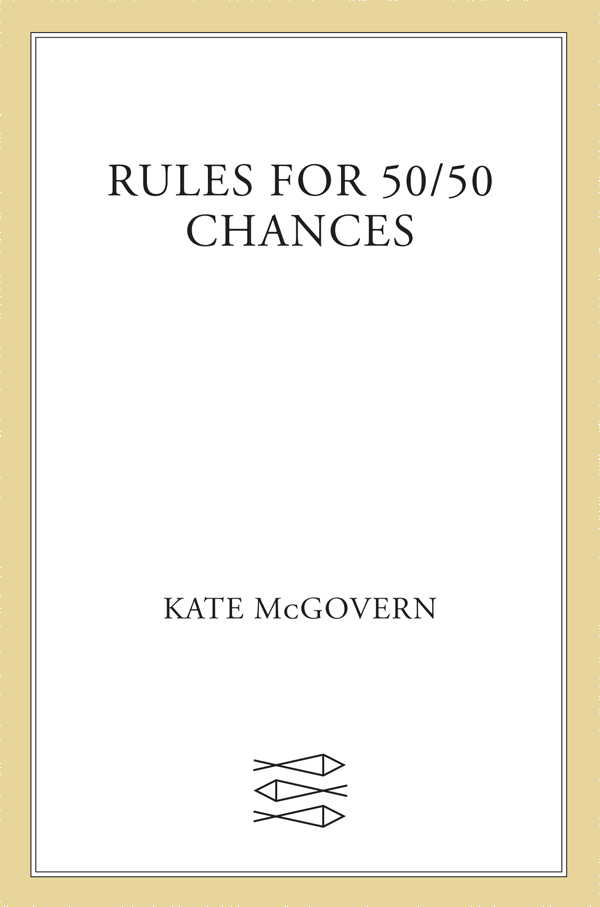
Rules for 50/50 Chances
A Novel
فرمت کتاب
ebook
تاریخ انتشار
2015
Lexile Score
820
Reading Level
3-4
نویسنده
Kate McGovernشابک
9780374301606
کتاب های مرتبط
- اطلاعات
- نقد و بررسی
- دیدگاه کاربران
نقد و بررسی

September 14, 2015
In a strong debut, McGovern investigates mortality, romance, family, race, and class. When Rose and Caleb meet at a “Walk for Rare Genes,” they appreciate not just each other’s company but also the chance to talk honestly about having a seriously ill family member. After Caleb points out how annoying “Sick Loved Ones” can be, Rose breaks another taboo by mentioning death. Caleb, who has family with sickle-cell disease, and Rose, with a 50/50 chance of inheriting Huntington’s, hit it off, but nothing is simple. Rose is deciding between attending college and pursuing ballet, but is either possible, given her mother’s deterioration? And what if Rose carries the Huntington’s gene? There’s a test for that, but no test to decide which is worse—knowing or not knowing. Additionally, Caleb is black, and Rose is white, which makes her realize how much she’s never had to think about. As narrator, Rose is articulate and sympathetic, and though Caleb and his family are a bit too perfect, McGovern skillfully engages with questions of fate, choice, and truly terrible luck. Ages 12–up. Agent: Mollie Glick, Foundry Literary + Media.

September 1, 2015
"My mother is my crystal ball," declares 17-year-old Rose Levenson. She's right in more ways than she believes. Rose's mother suffers from Huntington's disease, a rare, genetic, fatally progressive physical and mental disease-"the tiniest typo in a book with billions of words"-that Rose stands a 50 percent chance of developing. When she meets Caleb, an African-American art student whose mother and sisters have sickle cell anemia, she realizes that she can take a genetic test when she's 18 to find out whether she inherited more than her mother's love of trains and dancing. Her developing romance with Caleb, fraught with frank arguments on race and the perversely human tendency to compare problems, sparks more suspense than her life-or-death indecision about being tested. Despite everything the result would influence-college, family, a future in ballet-Rose's attitude is flatly pessimistic. While understandable against her mother's horrifying personality fluctuations, this is also frustrating. She highlights loss of empathy as a Huntington's symptom while extending little to family and friends herself, dismissing even her mother's grief as a "one-sided irrational disease-induced rampage"; by the time she acknowledges her friends' problems and her mother's personhood, readers may have lost their patience. McGovern tackles uncertainty in an array of forms-illness, college, career, love-with ethnically diverse characters and occasionally memorable phrases, but through Rose's often self-centered point of view, the result is uneven. (Fiction. 14-18)
COPYRIGHT(2015) Kirkus Reviews, ALL RIGHTS RESERVED.

October 1, 2015
Gr 9 Up-Rose has been dealing with her mother's Huntington's disease diagnosis since she was 12, and now that she looks toward college and adult life, she wonders if she will suffer the same fate. When she turns 18, she is legally allowed to take the genetic test that will give her an answer, which she thinks she needs in order to decide what choices to make about a career and family. Meeting Caleb at an event to raise money for genetic research throws a wrench in her thought process, as he lives with no fear of developing the sickle-cell disease that torments his sisters and mother. As they fall in love, Caleb shows Rose that life is about taking risks and following passions and that a test result that clears her of risk wouldn't promise safety or happiness, while one that predicted a painful degeneration would stop the indecisive Rose in her tracks. This evenly paced story is a balance between Rose and Caleb's romance and Rose's difficulties with her family, including her mother's often frustrating symptoms. Caleb is the most interesting of the characters, with a unique history and a more developed personality than the others. While this doesn't stand out from other titles about teens dealing with family illness or interracial relationships, the focus on Rose's indecisiveness and fears should appeal to fans of Gayle Forman's If I Stay (Dutton, 2009) and Lauren Oliver's Before I Fall (HarperCollins, 2010). VERDICT A general purchase for YA collections looking to beef up their teary realistic fiction sections.-Kerry Sutherland, Akron-Summit County Public Library, OH
Copyright 2015 School Library Journal, LLC Used with permission.

September 15, 2015
Grades 9-12 In her debut novel, McGovern writes with a sure hand about loss, love, and living with uncertainty. Since her mother's diagnosis six years ago with Huntington's, a debilitating genetic disorder, Rose has known that she has a 50/50 chance of inheriting the disease. She can take a predictive genetic test at 18, but that's a year away. Until then, Rose avoids committing to anything that presupposes a long, healthy life, like completing college applications, pursuing her ballet career, or falling in love. Then she meets Caleb, whose mother and sisters have sickle cell. He's empathetic to Rose's fears and heartbreak over her mother's deterioration, but he challenges her to see that her life can be happy and meaningful regardless of her genetics. Rose's bitter humor and Caleb's genuine kindness mix well, and they have frank conversations about illness, race, and class that feel natural to a developing relationship. Rose's relationships with her parents, especially her mother, are equally authentic and important to the story. This standout contemporary read should have wide appeal.(Reprinted with permission of Booklist, copyright 2015, American Library Association.)

























دیدگاه کاربران